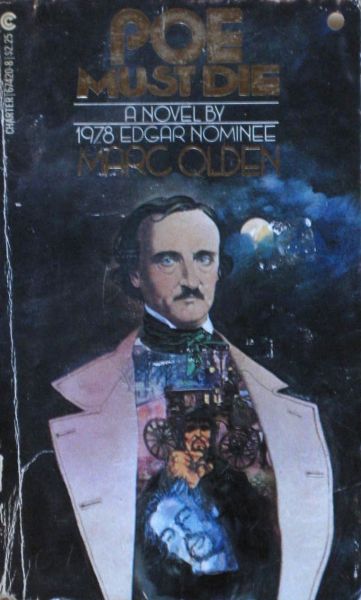The Defiant Ones
Poe Must Die
By Marc Olden

23 May, 2021
1978’s Poe Must Die is a standalone historical occult thriller by prolific author Marc Olden.
It’s 1848 and actor and sorcerer Jonathan is determined to uncover the location of Solomon’s Throne, which he believes to hold magical tomes of great import. These books would allow him to control Hell and rival God himself! Jonathan will commit crimes without number to succeed in his evil quest.
But the terminally ill American millionaire Justin Coltman is first past the post: he finds the crucial tomes. The actor follows Coltman back to America, hoping to recover the books.
A complication ensues, in the form of the brutal boxer Pierce James Figg.
Jonathan believes that Figg may be able to derail his quest. The sorcerer attacks first, murdering Figg’s wife Althea, feeding the corpse to Figg and his father-in-law (father-in-law finds out and suicides), and then framing Figg’s adopted son Will for a later murder.
Perhaps Jonathan intended to break Figg’s spirit. Figg doesn’t break. He resolves to find and punish the sorcerer. Armed with a letter of introduction and a belt full of gold coins (gifts from Charles Dickens) Figg pursues Jonathan to America.
America, where Edgar Allen Poe is dealing with his own problems. He is hopelessly besotted with Rachel Coltman, widow of Justin Coltman (the millionaire who acquired the books). Poe agrees to act as the widow’s intermediary in an attempt to buy back her late husband Justin’s corpse from the graverobbers who stole it (a robbery instigated by Jonathan).
Dealings with the graverobbers are complicated by Poe’s weakness for alcohol.
Poe is on Jonathan’s to do list. Poe must be suborned or if the canny writer cannot be transformed into a useful patsy, killed. The graverobbers (who have betrayed the sorcerer by opening negotiations with the widow) are less fortunate, as they have moved themselves from the category of “minion” to that of “human sacrifice.”
Poe and Figg end up as allies, but their first encounter is not propitious. Figg sees Poe as a feckless sot. Poe sees Figg as a violent brute. But Poe is brilliant and Figg has a prodigious talent for lethal violence. A complementary pair! They unite to foil Jonathan.
And that is why Poe must die.
~oOo~
I only recently discovered that Olden was African American. Always new opportunities to learn.
Poe Must Dieis ambivalent about whether Jonathan and Coltman’s beliefs in the occult are delusions. Former actor Jonathan is shown resorting to stagecraft to convince his minions and victims that he can do magic; at the same time, he believes that magic is real and that with the aid of the books, and suitable dark rites, he can control the fiends of Hell. Deluded or not, Jonathan is evil and dangerous; he must be stopped.
I don’t at all understand why Jonathan would attack Figg’s family while leaving Figg alive. If Figg is a danger, why not take him out? Perhaps Figg is just too dangerous to attack directly. Certainly, the book shows Figg repelling all attacks, leaving piles of corpses in his wake1.
I suspect that the author dusted off a timeworn trope here: the self-fulfilling prophecy. Attempting to evade fate, one assures it. Oedipus and all that.
There are historical mysteries in which the central characters just happen to be progressive by contemporary readers’ standards. This is not one of those books. Poe launches into a passionate defense of slavery early in the book. The protagonists (and all of the other characters) look down on and hate every ethnic group other than their own. Racist slurs abound. Which, to be fair, was true to the period. Readers looking for inspirational amity between the races should look elsewhere than New York City in 1848.
Olden was prolific and successful, so it is surprising the book is not better than it is. Perhaps this is explained by the following quote from the book:
[quote] “Bad taste is essential in both writer and reader if there is to be any literary success. Americans have always wallowed in bad taste and show no signs of reversing this trend.” [/quote]
So Olden wrote a supercharged pulp adventure of consummate bad taste. The book revels in violence, sexual perversity (in particular, an excessive number of child prostitutes even by the standards of the 1970s), violence, racist epithets, violence, horrific poverty, violence, cannibalism, and violence. It is loud and incoherent. It is not particularly good2.
Poe Must Dieis available here (Amazon US), here (Amazon Canada), here (Amazon UK), here (Barnes & Noble), here (Book Depository), and here (Chapters-Indigo).
1: To put it unhelpfully, everyone save Figg in the book is a Call of Cthulhucharacter, whereas Figg is clearly Pulp Cthulhu.
2: It seems odd that Idris Elba would have picked this bad book for a film adaptation. I am not sure of the current status of the project.
